|
|
|
Sort Order |
|
|
|
Items / Page
|
|
|
|
|
|
|
| Srl | Item |
| 1 |
ID:
173190
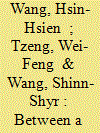

|
|
|
|
|
| Summary/Abstract |
In comparison to hegemony, lesser powers usually struggle for survival between two or more great powers under state power asymmetry, a perpetual phenomenon in international politics. With the rise of China and the increasingly strengthening role of the US in the Asia-Pacific region, it is important to learn how lesser powers manage their relations with the two. To explore this issue, we propose that the strength of state power will constrain the strategies of lesser powers as they choose between the US and China. Borrowing from existing theories and ideas on strategies that include balancing, bandwagoning, and hedging, we argue that the stronger a country’s power, the more likely it will choose a balancing strategy. At the same time, the weaker the country, the more likely that it will go with bandwagoning. Regional middle powers will show varied strategy choices, as they possess a higher degree of freedom in choosing which great power to side with. To validate these arguments, we construct two indicators — differences in trade dependence on the US and China and differences in the voting score consistent with the US and China — to quantify the strategies of lesser powers toward great powers and examine whether the variable of strategies follows the expected pattern. Our analysis shows that countries in the middle of the spectrum of state power demonstrated great freedom in choosing strategies toward the two powers.
|
|
|
|
|
|
|
|
|
|
|
|
|
|
|
|
| 2 |
ID:
177740
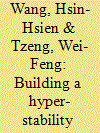

|
|
|
|
|
| Summary/Abstract |
Having been a stable authoritarian regime for more than seven decades, China is an excellent example of how authoritarian regimes can resist pressure from a rapidly transforming society. Its capacity to adapt to social change and maintain a strong hold on power has been observed by students of Chinese politics in the nature of its institutions. These include fragmented governments, decentralization, flexible governance, adaptive capacity, consultative functions, bargained mechanisms, and responsiveness. Xi Jinping’s rise to power and the introduction of information and communications technology (ICT) in recent years have brought about the evolution of the Chinese Communist Party’s methods for governing society. Changes in its governing strategy have merited a review of our understanding of the Chinese regime and inspired an investigation into how social stability is maintained in China. In this paper, we review previous descriptions of China’s authoritarianism and observe the policies the Xi regime has adopted to strengthen state power. We propose that for the purposes of social control, the Xi administration has been building a hierarchical state machine and expanding this machine to the digital sector of society, a campaign which we call “institutional autocratization.” These efforts to establish a hyper-stability structure with new technologies may indeed have strengthened Xi’s rule.
|
|
|
|
|
|
|
|
|
|
|
|
|
|
|
|
| 3 |
ID:
157481
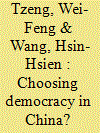

|
|
|
|
|
| Summary/Abstract |
We argue that the choice of electoral rules in Chinese villages results from the incentives that rural party elites face in their efforts to control electoral results. Using the rationalist approach, we propose four conditions under which they will adopt an institution that allows for electoral uncertainty: a large proportion of revenue from village-owned enterprises (VOEs), a large size of electorate, the presence of strong social groups, and frequent upper level government interventions. We use the 2011 Wukan incident to illustrate our argument. The cross-sectional analysis of survey data of 961 villages provides some evidence for the hypotheses: A larger number of labor force and frequent inspections by the upper-level government are significantly correlated with an increase of the likelihood that a village party leader allows villagers to freely nominate candidates. Theoretical and policy implications will be discussed in the end of this paper.
|
|
|
|
|
|
|
|
|
|
|
|
|
|
|
|
| 4 |
ID:
164807
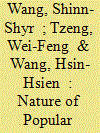

|
|
|
|
|
| Summary/Abstract |
While China’s economic reforms have produced undeniably positive outcomes, a rapid increase in popular protests has become most striking in recent years. As protests grow steadily in both scale and frequency, the government continues to tout social stability as the chief concern of China today. These mounting tensions reflect a direct clash of horns between the maintenance of stability and the public’s desire to exercise their rights, frequently culminating in acts of repression by the Chinese state in order to quell the unrest. This raises an important question: how can the relationship between repression and popular protest in China be characterized? More specifically, which precise circumstances of popular protest elicit the employment of China’s repressive state capacity? Taking into account both theoretical perspectives and empirical analysis, this paper attempts to elucidate the issue by first collating a large body of data to clarify the precise characteristics of popular protest, then undertaking quantitative analysis to identify which factors trigger the mobilization of China’s machinery of repression. Furthermore, this study identifies that in recent years, the use of state repression has risen in parallel with an increasing emphasis on the principle of “maintaining social stability” in China.
|
|
|
|
|
|
|
|
|
|
|
|
|
|
|
|
| 5 |
ID:
193139
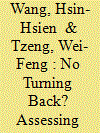

|
|
|
|
|
| Summary/Abstract |
This paper collects and analyzes the speeches of top Chinese leaders on Taiwan, the relevant remarks of Taiwan-related ministries and commissions, and important documents concerning Taiwan. It takes the visit of U.S. House Speaker Nancy Pelosi to Taiwan as an example to observe China’s current policy toward Taiwan and its intent to employ force. This paper argues that although the outside world has repeatedly emphasized that “Taiwan is the most dangerous place on earth” and that China will invade Taiwan by force, peaceful unification is still the main axis of its strategy toward Taiwan. Military force is an avenue for China to force unification and prevent international interference in the Taiwan issue. The results of our analysis of Taiwan-related remarks by top Chinese leaders and relevant ministries and commissions are also highly consistent with the political report of the 20th Party Congress, and there are two noteworthy points. First, China has linked “opposing independence” with “opposing interference by external forces” and the principle of “never renouncing the right to use force over Taiwan.” From Beijing’s perspective, the Taiwan issue is no longer one simply involving cross-strait relations but is embedded in China’s domestic national rejuvenation and the strategic competition between itself and the United States. Moreover, Xi Jinping is the most critical factor affecting cross–strait relations. As a strong leader with a historic mission, how Xi regards the Taiwan issue will affect both the destiny of Taiwan and the security of the entire Asia-Pacific region.
|
|
|
|
|
|
|
|
|
|
|
|
|
|
|
|
| 6 |
ID:
160115


|
|
|
|
|
| Summary/Abstract |
This paper explores the factors that affect Taiwanese citizens’ resistance to closer relations with China. Elements in Taiwanese society have recently exhibited a strong sense of anxiety in the face of a rising China. Distinct from the past military confrontation between China and Taiwan, more recently, Taiwanese citizens have been subject to a strengthening of cross-Strait relations and interactions, which makes their rising resistance to China puzzling. To empirically and theoretically explain why Taiwanese are resistant to closer ties with the mainland, we discuss three potential sources: cultural alienation, democratic anxiety, and economic interest. We test the effects of these three attitudinal factors on Taiwanese resistance to Chinese tourists, students, and workers using the China Impact Survey 2012 data set. The findings suggest that democratic anxiety, economic interest, and cultural alienation are all strong predictors in accounting for the public’s resistance to Chinese tourists and students, while economic interest is the most powerful factor in Taiwanese attitudes toward policies regarding Chinese workers. The findings provide important policy implications for policy makers in dealing with cross-Strait relations.
|
|
|
|
|
|
|
|
|
|
|
|
|
|
|
|
|
|
|
|
|